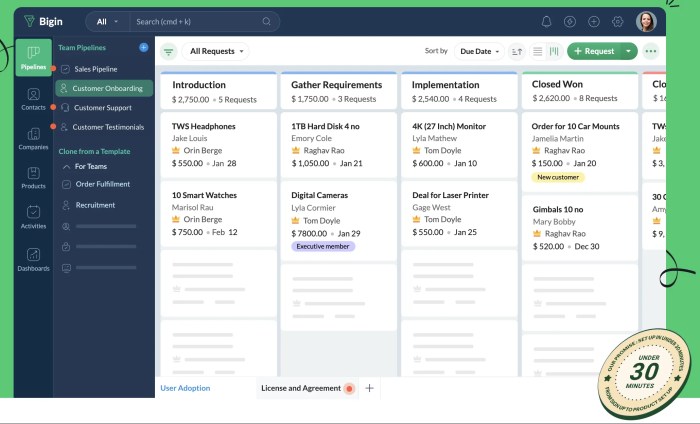Crm software for accountants – In today’s competitive landscape, accounting firms need more than just proficiency in numbers; they need efficient systems to manage client relationships, automate tasks, and boost overall productivity. This is where Customer Relationship Management (CRM) software steps in. A well-chosen CRM can transform your accounting practice, improving client satisfaction, increasing profitability, and freeing up valuable time for strategic initiatives.

Source: hubspot.com
This comprehensive guide explores the benefits of CRM software for accountants, key features to look for, popular options available, and how to choose the right solution for your firm’s specific needs.
Understanding the Benefits of CRM for Accounting Firms
Implementing a CRM system offers a multitude of advantages for accounting practices of all sizes. These benefits extend beyond simple contact management, impacting various aspects of your business:
- Improved Client Relationship Management (CRM): Centralized client data provides a 360-degree view of each client, including contact information, communication history, financial details, and project timelines. This holistic understanding enables personalized service and strengthens client relationships.
- Enhanced Client Communication: Streamline communication through integrated email, phone, and messaging features. Automated email campaigns for reminders, newsletters, and tax season updates enhance client engagement and improve response rates.
- Increased Efficiency and Productivity: Automate repetitive tasks such as data entry, appointment scheduling, and report generation, freeing up your team to focus on higher-value activities like financial analysis and client consultations. This leads to significant time savings and improved overall productivity.
- Better Task and Project Management: Assign tasks, track progress, and manage deadlines effectively. A CRM’s project management features ensure that projects stay on track and deadlines are met, minimizing delays and improving client satisfaction.
- Improved Team Collaboration: Centralized information ensures everyone on your team has access to the same client data, fostering seamless collaboration and reducing the risk of miscommunication or duplicated efforts.
- Data-Driven Insights and Reporting: CRM systems provide valuable data analytics and reporting capabilities. Track key performance indicators (KPIs) such as client acquisition costs, revenue per client, and client retention rates to gain insights into your firm’s performance and identify areas for improvement.
- Scalability and Growth: A well-chosen CRM can scale with your firm’s growth, adapting to changing needs and accommodating an increasing number of clients and team members.
Key Features of CRM Software for Accountants
While the core functionality of CRM remains consistent, certain features are particularly valuable for accounting firms. Look for these essential features when evaluating CRM options:

Source: crmrank.com
Essential Features:
- Client Portal: Secure client access to documents, communication, and financial information promotes transparency and empowers clients to manage their accounts independently.
- Document Management: Centralized storage and easy access to client documents, tax returns, and other relevant files eliminates the need for cumbersome file searching and reduces the risk of lost or misplaced information.
- Integration with Accounting Software: Seamless integration with your existing accounting software (e.g., QuickBooks, Xero) streamlines data flow and eliminates manual data entry, reducing errors and saving time.
- Customizable Workflows and Automation: Automate repetitive tasks such as invoice generation, payment reminders, and client onboarding to optimize efficiency and reduce manual intervention.
- Reporting and Analytics: Generate comprehensive reports on key performance indicators (KPIs) to track progress, identify trends, and make data-driven decisions.
- Security and Data Privacy: Robust security measures are crucial to protect sensitive client data. Ensure the CRM provider complies with relevant data privacy regulations (e.g., GDPR, CCPA).
Advanced Features (Consider these based on your firm’s needs):, Crm software for accountants
- Time Tracking: Monitor time spent on client projects for accurate billing and profitability analysis.
- Project Management Tools: Manage projects effectively, track progress, and ensure timely completion.
- Marketing Automation: Automate marketing tasks such as email campaigns and social media updates to enhance client engagement.
- Mobile Accessibility: Access client information and manage tasks on the go with a mobile-friendly CRM.
Popular CRM Software Options for Accountants
The market offers a range of CRM solutions catering to various accounting firm sizes and budgets. Some popular options include:
- Zoho CRM: A versatile and affordable option with robust features and integrations.
- Xero: Offers integrated CRM features within its accounting software, streamlining workflows.
- QuickBooks Online: Similar to Xero, provides integrated CRM capabilities for enhanced efficiency.
- Salesforce: A powerful and scalable solution suitable for larger accounting firms with complex needs.
- HubSpot CRM: A freemium option with a strong focus on marketing and sales automation.
Note: This is not an exhaustive list, and the best CRM for your firm will depend on your specific requirements and budget. It’s recommended to research and compare various options before making a decision.
Choosing the Right CRM Software for Your Accounting Firm: Crm Software For Accountants
Selecting the right CRM involves careful consideration of several factors:
- Firm Size and Budget: Choose a solution that aligns with your firm’s size and budget. Smaller firms might opt for affordable options, while larger firms might need more scalable and feature-rich solutions.
- Integration with Existing Software: Ensure seamless integration with your accounting software and other essential tools to avoid data silos and streamline workflows.
- User-Friendliness: Choose a CRM that is intuitive and easy to use for your team, minimizing the learning curve and maximizing adoption rates.
- Scalability and Future Needs: Select a solution that can grow with your firm, accommodating an increasing number of clients and team members.
- Security and Data Privacy: Prioritize security features to protect sensitive client data and ensure compliance with relevant regulations.
Frequently Asked Questions (FAQs)
- Q: How much does CRM software for accountants cost? A: The cost varies significantly depending on the provider, features, and number of users. Some offer free plans with limited features, while others charge monthly or annual subscriptions based on usage.
- Q: Can I integrate my CRM with my existing accounting software? A: Most CRM solutions offer integrations with popular accounting software like QuickBooks and Xero. However, it’s crucial to verify compatibility before purchasing.
- Q: How long does it take to implement a CRM? A: Implementation time varies depending on the complexity of the CRM and the size of your firm. It can range from a few weeks to several months.
- Q: What training is required for my team? A: Most CRM providers offer training resources, including online tutorials, documentation, and support. The level of training required depends on the CRM’s complexity and your team’s technical skills.
- Q: What are the potential challenges of implementing a CRM? A: Potential challenges include data migration, user adoption, integration issues, and the need for ongoing maintenance and support.
Conclusion
Implementing CRM software is a strategic investment that can significantly enhance the efficiency and profitability of your accounting practice. By streamlining workflows, improving client communication, and providing valuable data insights, a well-chosen CRM empowers your firm to focus on delivering exceptional service and achieving sustainable growth. Take the time to research and compare different options to find the perfect fit for your unique needs.
References
Call to Action
Ready to take your accounting practice to the next level? Explore the CRM options mentioned above and choose the one that best suits your needs. Contact us today for a free consultation to discuss your specific requirements and find the perfect CRM solution for your firm.
FAQ Guide
What types of CRM software are best suited for accountants?
Cloud-based CRMs are generally preferred for their accessibility and scalability. Look for features specifically designed for accounting, such as integration with accounting software and robust reporting capabilities.
How much does CRM software for accountants cost?
Pricing varies greatly depending on the features, number of users, and vendor. Expect to find options ranging from affordable monthly subscriptions to more enterprise-level solutions with higher costs.
What are the key features to look for in accounting CRM software?
Essential features include contact management, task management, client portal access, reporting and analytics, and integration with existing accounting software.
How long does it take to implement CRM software?
Implementation time depends on the complexity of the system and the size of your firm. Smaller firms might see results within weeks, while larger firms may require several months.
